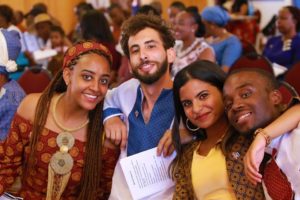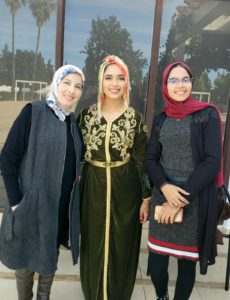For Peace Corps volunteer Sebrine Abdulkadir ’19, posted in the southern African country of Botswana, the upheaval happened fast.
On a Monday morning in mid-March, she received an email saying she and other Peace Corps volunteers worldwide would be evacuated from their posts because of the COVID-19 pandemic.

In three hours Abdulkadir packed what possessions she could from her house in the village of Good Hope, near the South African border. She left other belongings in the care of colleagues who had worked with her on projects to educate young people about HIV/AIDS.
By Monday evening, she was on her way to Botswana’s capital, Gaborone. And Wednesday morning she began her journey home, flying through South Africa and the United Arab Emirates before arriving in Washington, D.C.
“I didn’t really believe it till I was walking onto the plane,” Abdulkadir said. “It was stressful. I didn’t really have the chance to say goodbye.”
After a two-week quarantine upon returning to the United States, Abdulkadir has joined her mother and 7-year-old brother at home in Alexandria, Virginia. From her independent adult life and her own house in Botswana, the 22-year-old finds herself once again under a parent’s roof and contemplating her next steps.
Abdulkadir was one of America’s 7,300 Peace Corps volunteers being reclassified as having completed their service. That number includes a dozen from UMW, which ranks No. 7 among top-producing colleges and universities with fewer than 5,000 students.
Being sent home is a dramatic change, but Jose Sainz, director of UMW’s Center for International Education and an associate professor in the Department of Modern Languages and Literatures, said the Peace Corps organization has a history of supporting its returned volunteers and lobbying for them in the halls of power.
It’s still unclear whether volunteers will ever return to their specific postings, but the Peace Corps has indicated that they may be able to reapply at some point.

And Sainz is confident the Peace Corps, which he called “a landmark of foreign diplomacy,” will continue its long tradition of service once the pandemic subsides. “I think this will be remembered as a hiccup, a bump in the road,” he said.
As for the UMW volunteers, Sainz predicted that at least in the short term their desire to serve could lead to similar work in the United States.
That’s an avenue Abdulkadir is considering. She’s inquiring about stateside jobs and also looking into master’s degree programs in international relations.
One reason she chose UMW, she said, was its reputation for producing Peace Corps volunteers. A total of 270 alumni have joined the Peace Corps since its 1961 inception.
At Mary Washington, Abdulkadir majored in international affairs with a social justice minor and spent a semester studying abroad in Cannes, France. She graduated last May and started her Peace Corps service in late summer. She’s conversational in both French and, thanks to her Ethiopian roots, Amharic – though Botswana’s official language is English.
While she’s sorry not to have served longer in Botswana, Abdulkadir is philosophical about why the Peace Corps brought its volunteers home and understands that it was for everyone’s safety. But she’s also confident that an international career is in her future.
“I love the idea of going to Africa, of volunteering or making some other positive contribution to society,” she said. “This is not going to be the end of my international experience.”